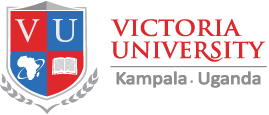Quick Facts
Credential
Bachelor's Degree
Delivery Options:
Both On-Campus and Online - Some of your Classes will be in-person, on campus and some will be done online.
Duration: 3 years
With a typical full-time course load, this programme will take 3 years to complete.
Language of instruction
english
Admission Requirements
Normal Entry Requirements for Degree Courses (in line with NCHE requirements)
To gain admission to the programme, you must first of all satisfy the general requirements for admission into Victoria University at a Bachelor's level. In addition, a candidate shall be eligible for admissions to the programme on meeting any of the following minimum qualifications:
Direct Entry:
At least Two Principal passes in the Uganda Advanced Certificate of Education (UACE) or its equivalent
and at least a credit in English and Mathematics at O-level.
Other entry requirements:
Professional qualification: candidates who completed level one of any professional programme will also be eligible.
OR
Mature age scheme: Passed a mature age entrance examinations.
Foundation programme: Applicants should have passed with at least a class three (Pass) equivalent to 2.00 to 2.79.
Credit transfer from other universities:
There will be a possibility of credit transfer from other Ugandan Universities. The formula will be worked out accordingly.
Applicants whose first language is not English will be required to demonstrate a proficiency in the English language by passing an English proficiency Test conducted by the University.
Admission Requirements for Undergraduate Students (Ugandans)
Diploma transcript if applicable
Certificate transcript if applicable
UACE result slip
UCE result slip
National ID/passport/ birth certificate
Passport photos
Admission fees UGX250,000
Bank: STANBIC BANK
USD Account: 9030020161247
Swift Code: SBICUGKX
Admission Requirements for Undergraduate student (Non-Ugandans)
· Equated Secondary certificate from UNEB
· Equated Diploma transcript if applicable from NCHE
· Equated Certificate if applicable from NCHE
· National ID/passport/ birth certificate
· Passport photos
· Admission fees $78
Bank: STANBIC BANK
Account: 9030020161085
What you will Learn
When you successfully completes the course you will have achieved the following Course Learning Outcomes:
You will be able to demonstrate a broad and deep understanding of international relations. Know the major analytical and theoretical frameworks regarding international relations employed in political science and related disciplines. Understand international institutions and forces that drive behavior in international relations.
You will be able to possess the skills necessary to think critically and communicate effectively about international relations. Communicate ideas through written argument. Use evidence to critically analyze ideas or policies.
You will be able to value active citizenship and a just society. Appreciate the rights and responsibilities of global citizenship. Recognize issues of social justice in global contexts.
You will be able to obtain proficiency in a foreign language.
Career Opportunities
Students who have studied International Relations and Diplomatic Studies acquire a unique set of skills and knowledge that prepare them for a wide range of exciting career opportunities in the global arena. Here are some potential career paths:
International Organizations: Graduates can work for international organizations such as the United Nations (UN), World Bank, International Monetary Fund (IMF), or regional organizations like the European Union (EU) or African Union (AU). They may serve in roles related to policy analysis, program management, peacekeeping operations, or humanitarian assistance, contributing to global development, peace, and security efforts.
Diplomatic Service: Graduates can pursue careers as diplomats, representing their home countries abroad and engaging in negotiations, diplomacy, and conflict resolution on behalf of their governments. They may work in embassies, consulates, or international organizations, promoting their country's interests and fostering diplomatic relations with other nations.
Foreign Service: Graduates can pursue careers in their country's foreign service, working in ministries of foreign affairs or diplomatic missions abroad. They may specialize in areas such as political affairs, economic affairs, consular services, or cultural diplomacy, representing their country's interests and advancing diplomatic objectives on the international stage.
International Development: Graduates can work in international development agencies, non-governmental organizations (NGOs), or aid organizations, focusing on poverty alleviation, sustainable development, and humanitarian assistance. They may work in roles related to project management, program evaluation, policy advocacy, or capacity building, addressing global challenges such as poverty, inequality, and environmental sustainability.
International Trade and Commerce: Graduates can work in international trade organizations, multinational corporations, or government agencies involved in trade and commerce. They may work in roles related to trade policy analysis, market research, export-import management, or international business development, facilitating trade relations and promoting economic growth.
Journalism and Media: Graduates can work as journalists, correspondents, or analysts covering international affairs for newspapers, magazines, television networks, or online media outlets. They may specialize in foreign reporting, investigative journalism, or multimedia storytelling, informing the public about global events, trends, and issues shaping the world.
Intelligence and Security: Graduates can pursue careers in intelligence agencies, security services, or defense organizations, analyzing threats, conducting risk assessments, and providing strategic intelligence to policymakers and decision-makers. They may work in roles related to intelligence analysis, counterterrorism, cybersecurity, or national security policy.
Tuition & Fees
The tuition and fee amounts are estimates based on current academic year's rates. For financial planning purposes, please use these totals as an approximate estimate of your costs. Actual fees may vary by term and enrolment activities.
Download
